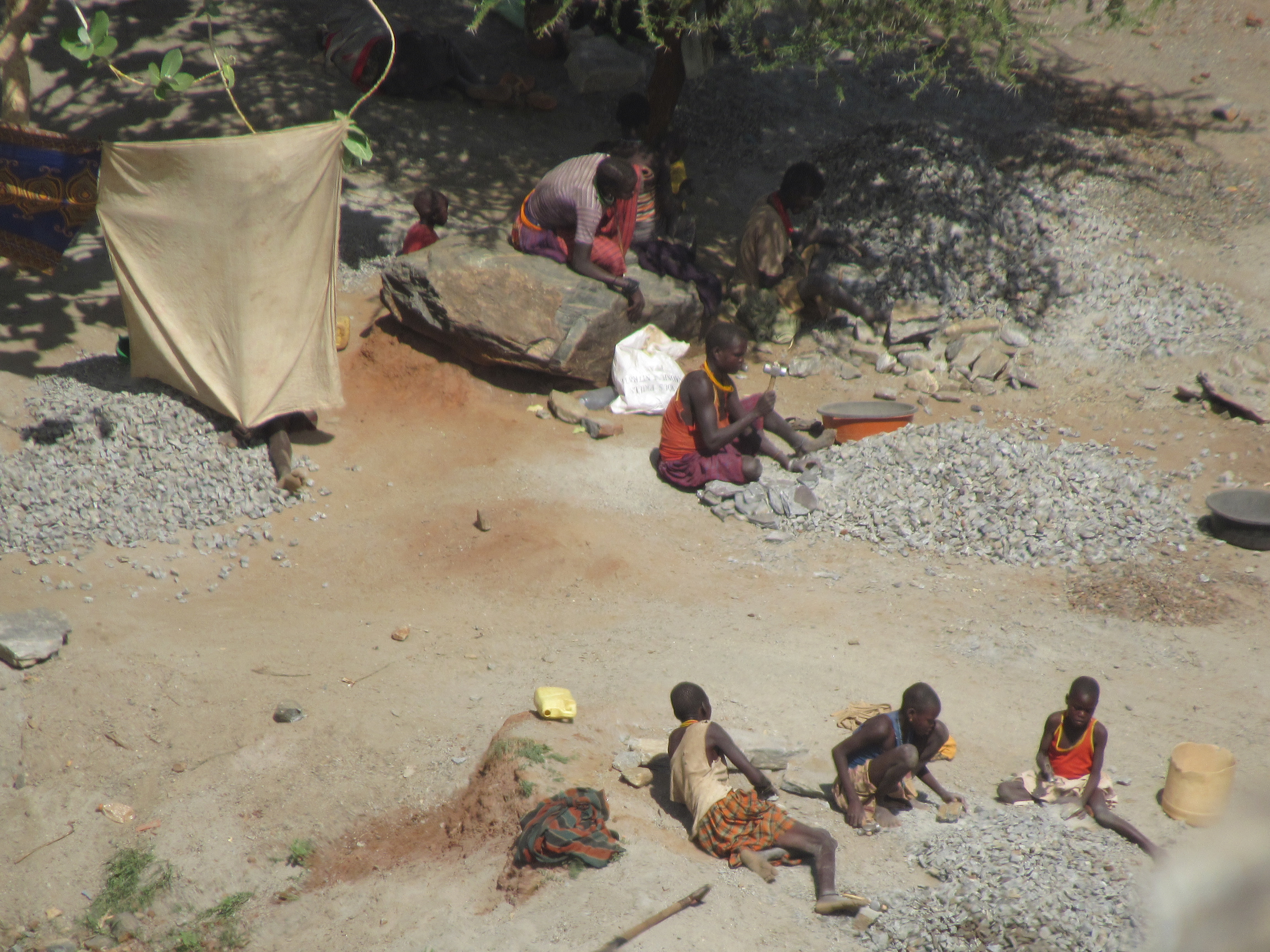NGOs, mining companies, and rock-splitters

In this article, the author talks about the complicity of non-governmental organisations and mining companies in impoverishing the people of Moroto, northeast of Uganda.
Beyond the summit of Mount Moroto, in the Moroto District of northeast Uganda’s Karamoja Region, another peak touches the sky ahead. A local man describes this next peak as home to “the Tepeth people” who are in conflict with the Ugandan People’s Defence Force (UPDF) and have raided cattle in the past. In Karamoja, cattle raiders and the UPDF engage in constant conflict since the early 2010s. The conflict zone is close to Mount Moroto, just a few kilometres away. The UPDF monitors the other side of the mountain. No one can go there unless armed with a gun.
According to Human Rights Watch, between 2004 and 2006, there were 474 raids and 1,057 casualties before the UPDF began disarming raiders. Local people gave examples of the politics of cattle raiding around Moroto. A rock-splitter at Mount Moroto remembered stealing cattle from Bokora, another ethnic group, who would then steal them back the next day. Another resident recalled being handed an AK-47 when he was ten years old to raid rival groups, though he raided cattle for “only two days.”
On one of the mountain’s ridges, we meet members of the Karamajong ethnic group, described by the UPDF as “warriors,” who had their guns seized but still walk along the mountain with bows, arrows, and dogs. From a precipice looking down, the “warriors” gesture towards Moroto Town, which is filling up with buildings for projects in the name of international development. This means more non-governmental organisations (NGOs), United Nations agencies, foreign governmental groups, and wealthy investors, whose interests influence the politics of residents’ livelihoods.
Below us, heavy machinery extracts large rocks from the mountain, which are brought down to human rock-splitters at the base. At the same time as NGOs were coming to Karamoja, the UPDF disarmed cattle raiders, and mining companies arrived in the area. These NGO projects focused on problems perceived to be created by local, violent conflicts rather than conflicts that can be associated with problems arising from “development.” “Development”, in this context, means an approach to urbanising and bringing industries to extract resources where the ends justify the means.
According to the 2015 National Development Plan II, Moroto is set to become a “strategic city” for mining. For Moroto, one outcome is international investment and funding from the Central Government for the construction of city roads, according to the Daily Monitor. In November 2016, Moroto Municipal Authorities described plans to tarmac roads in town, according to New Vision. Mining companies arriving with the UPDF to profit from the region meant some NGOs perpetuated development abuses.
Stone quarries have accompanied a larger mining boom as gold, marble, limestone, and gypsum were discovered in 2011 in the area of Moroto, according to the Daily Monitor. In 2012, NGOs rushed to Karamoja’s new “hotspot,” where mining is the priority for the state and international companies. A rock-splitter notes that, with the arrival of a number of NGO buildings for offices in town, the demand for split rocks to build roads has increased.
Rock-splitters explained that for every basin (approximately 27 litres) of rocks they produce, they receive 200 shillings (US$ 0.06). One man explains how the mining company originally paid 2,000 shillings (US$ 0.57) to rock-splitters at mid-day so they could get a meal but they haven’t been paid for a mid-day meal in three months. Rock-splitters criticised NGOs for favouring road development over agricultural income-generating alternatives for residents struggling with financial precarity and splitting rock for starvation wages in stone quarries.
Earlier that year, rock-splitters asked both mining companies and NGOs for “hammers, pick-axes, or tools” to produce enough rocks for economic stability, but they were refused by both groups. According to rock-splitters, NGOs argued that it was not part of their proposal, procedure, or plan. NGOs may have worried that the tools would be used as weapons for conflict rather than implements to alleviate poverty.
In an effort to alleviate stress created by raids in a cattle-oriented region, NGOs had provided seeds in the past for generating crops as an alternate source of income and sustenance. The choice of NGOs to refrain from offering seeds, then, had a detrimental effect on the livelihood of the population. A rock-splitter explained, “Last time, NGOs brought seeds for nursery beds [to grow crops], but this time they didn’t.” No seeds from NGOs mean fewer crops, which means splitting rock to build roads is a better livelihood option.
The UPDF and mining companies limit options local people have for making a living. NGOs buy property requiring new roads that depend on the exploited labour of the rock quarries, and on local people who will work in the quarries rather than survive through agriculture or maintaining livestock. NGOs’ decisions not to provide seeds, and the UPDF collaboration with mining companies after the disarmament of cattle raiders are some reasons why rock-splitters critique the role of humanitarian and development agendas in their communities. International groups’ relationships to the continent often create wealth at the expense of local economies, workers’ rights, and African autonomy.
Note:A 2011 survey by the Uganda department of geological survey and mines at the Ministry of Energy found that Karamoja is also endowed with other minerals including limestone, uranium, marble, graphite, gypsum, iron, wolfram, nickel, copper, cobalt, lithium and tin. See: https://www.theguardian.com/global-development/2014/feb/04/mineral-deposits-mining-uganda-karamoja-human-rights-abuse-report
*Aran Valente is from North Kingstown, Rhode Island, USA. He has a degree in political science from the University of Rhode Island. Aran taught Social Studies and Library Studies for two years at the Kabale-Bukinda Primary Teachers' College in Bukinda Subcounty, Kabale District, Uganda.
